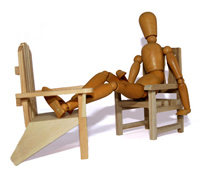Difference between revisions of "Sedentary"
(Created page with 'File:lighterstill.jpgright|frame ==Origin== Middle French ''sedentaire'', from Latin ''sedentarius'', from ''sedent''-, ''sedens'', present partic...') |
m (Text replacement - "http://" to "https://") |
||
| Line 3: | Line 3: | ||
==Origin== | ==Origin== | ||
Middle French ''sedentaire'', from [[Latin]] ''sedentarius'', from ''sedent''-, ''sedens'', present participle of ''sedēre'' to sit. | Middle French ''sedentaire'', from [[Latin]] ''sedentarius'', from ''sedent''-, ''sedens'', present participle of ''sedēre'' to sit. | ||
| − | *[ | + | *[https://en.wikipedia.org/wiki/16th_century 1598] |
==Definitions== | ==Definitions== | ||
*1: not migratory : settled <sedentary birds> <sedentary [[civilizations]]> | *1: not migratory : settled <sedentary birds> <sedentary [[civilizations]]> | ||
| Line 10: | Line 10: | ||
*3: permanently attached <sedentary barnacles> | *3: permanently attached <sedentary barnacles> | ||
==Description== | ==Description== | ||
| − | '''Sedentary''' [[lifestyle]] is a [[medical]] term used to denote a [[type]] of lifestyle with no or irregular [[physical]] [[activity]]. A [[person]] who lives a sedentary [[lifestyle]] may [ | + | '''Sedentary''' [[lifestyle]] is a [[medical]] term used to denote a [[type]] of lifestyle with no or irregular [[physical]] [[activity]]. A [[person]] who lives a sedentary [[lifestyle]] may [https://en.wikipedia.org/wiki/Colloquially colloquially] be known as a ''couch potato''. It is commonly found in both the developed and developing world. Sedentary activities include sitting, [[reading]], watching television and computer use for much of the day with little or no [[vigorous]] [[physical]] [[exercise]]. A sedentary [[lifestyle]] can contribute to many preventable causes of [[death]]. |
One [[response]] that has been [[adopted]] by many concerned with [[health]] and [[environment]] is the use of [[active]] travel, which seeks to promote walking and cycling as safe and [[attractive]] alternatives to motorized [[transport]]. Given that many [[journeys]] are for relatively short distances, there is considerable [[scope]] to replace car use with walking or cycling, though in many settings this may require some [[infrastructure]] modification. | One [[response]] that has been [[adopted]] by many concerned with [[health]] and [[environment]] is the use of [[active]] travel, which seeks to promote walking and cycling as safe and [[attractive]] alternatives to motorized [[transport]]. Given that many [[journeys]] are for relatively short distances, there is considerable [[scope]] to replace car use with walking or cycling, though in many settings this may require some [[infrastructure]] modification. | ||
Latest revision as of 02:32, 13 December 2020
Origin
Middle French sedentaire, from Latin sedentarius, from sedent-, sedens, present participle of sedēre to sit.
Definitions
- 1: not migratory : settled <sedentary birds> <sedentary civilizations>
- 2a : doing or requiring much sitting <a sedentary job>
- b : not physically active <a sedentary lifestyle>
- 3: permanently attached <sedentary barnacles>
Description
Sedentary lifestyle is a medical term used to denote a type of lifestyle with no or irregular physical activity. A person who lives a sedentary lifestyle may colloquially be known as a couch potato. It is commonly found in both the developed and developing world. Sedentary activities include sitting, reading, watching television and computer use for much of the day with little or no vigorous physical exercise. A sedentary lifestyle can contribute to many preventable causes of death.
One response that has been adopted by many concerned with health and environment is the use of active travel, which seeks to promote walking and cycling as safe and attractive alternatives to motorized transport. Given that many journeys are for relatively short distances, there is considerable scope to replace car use with walking or cycling, though in many settings this may require some infrastructure modification.
